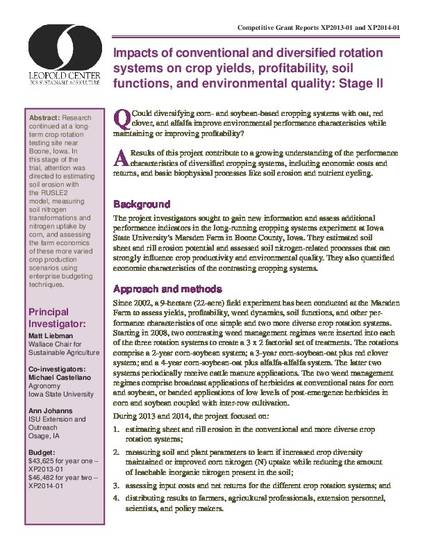
Other
Impacts of conventional and diversified rotation systems on crop yields, soil functions and environmental quality: Stage II/Year 2
Leopold Center Completed Grant Reports
Project ID
XP2014-01
Abstract
Research continued at a long-term crop rotation testing site near Boone, Iowa. In this stage of the trial, attention was directed to estimating soil erosion with the RUSLE2 model, measuring soil nitrogen transformations and nitrogen uptake by corn, and assessing the farm economics of these more varied crop production scenarios using enterprise budgeting techniques.
Key Question
Could diversifying corn- and soybean-based cropping systems with oat, red clover, and alfalfa improve environmental performance characteristics while maintaining or improving profitability?
Findings
Results of this project contribute to a growing understanding of the performance characteristics of diversified cropping systems, including economic costs and returns, and basic biophysical processes like soil erosion and nutrient cycling.
Principal Investigator(s)
Matt Liebman
Co-Investigator(s)
Michael Castellano
Project Coordinator
Ann Johanns
Year of Grant Completion
2015
Disciplines
Citation Information
Matthew Z. Liebman, Michael J. Castellano and Ann M. Johanns. "Impacts of conventional and diversified rotation systems on crop yields, soil functions and environmental quality: Stage II/Year 2" (2015) Available at: http://works.bepress.com/castellano-michael/15/
